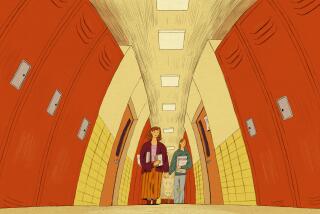Crib Notes on Books Miss the Real Story
I remember the first time a senior told me that “1984” was the first book he’d actually read in high school. It knocked me for quite a loop then, but such confessions aren’t shocking anymore. The truth is, very little reading is going on in secondary schools.
A huge percentage of students will skip a lot of the assigned books or read only parts of them. Using a combination of Cliff’s Notes and class notes, any bright student can pass tests and write papers on a book without ever cracking the cover.
If you doubt me, just ask them--though few will readily admit to this practice. They know it’s a sure-fire way to upset their parents, their teachers and even the ghost of Mark Twain.
“If I can pass a test and get a B on a paper, then why read it?” a sophomore may well ask. The answer is simple. One can learn how the teacher feels about the book by paying attention in class or understand the plot by reading outside notes, but that’s not the book. It’s like trying to experience a sunset through someone else’s description of it. It may be an amazing description, but it can’t affect one’s life.
To begin to realize what a student loses by not actually reading “Hamlet,” let’s look at Polonius’ advice to his son Laertes before he goes off to college. Cliff’s Notes says, “Polonius enters, offering his son fatherly advice on how to conduct himself.” Thus, one of the most beautiful speeches in the English language has been reduced to an uninspired plot summary. If the girl in the front row who is always trying to please everyone settles for the summary, she will never read those incredible words, “To thine own self be true.”
In the case of “Heart of Darkness,” consider Joseph Conrad’s haunting description: “They were not enemies, they were not criminals, they were nothing earthly now . . . nothing but black shadows of disease and starvation, lying confusedly in the greenish gloom.” But if the captain of the water polo team turns to Cliff’s Notes, he will merely read: “Marlow gives the reader a glimpse into the grove of death.”
There are times when taking shortcuts may be inevitable if a student is overwhelmed, has the lead in the spring play or is assigned ridiculous amounts of reading. But such dishonesty is now routine, and too many parents know it is going on and allow it to happen.
To avoid books routinely is to miss what it means to be educated. Reading, unlike television, forces us to use our own imagination. It allows us to venture beyond the boundaries of our own lives--down the Congo River, into the trenches of Verdun, across the plains of Troy. Reading gives us a common experience base with other educated people.
Over the years, I’ve noticed certain traits in young people who read. They get excited about things, they’re curious, and they’re open to new ideas. Most exciting: They allow literature to affect their lives.
If students are not strong readers or have a short attention span, there may be little joy to be found in books. They will announce loudly that they don’t like to read and hope that’s the end of the discussion. But let’s face it: Nobody learned to value reading by not doing it.
If you want assurance that your children are not “Cliffing” their way through high school, you’ll have to come up with ways to be sure they are actually moving their eyes across the pages. Have them read “Of Mice and Men” where you can see them. Ask them why George continues to take care of Lennie. Insist that they read aloud about the death of Candy’s dog. Let them know that Steinbeck’s immortal story matters, that there are insights to be gained into our own lives.
Yes, there are books that can be boring, and there are instructors who do not inspire a love of literature. But there are countless teachers who are assigning wonderful literature to kids who won’t read it. If we’re ever going to become a more literate and thoughtful society, those teachers need all the help they can get. “All Quiet on the Western Front” may get assigned at school, but it gets read at home.
More to Read
Sign up for our Book Club newsletter
Get the latest news, events and more from the Los Angeles Times Book Club, and help us get L.A. reading and talking.
You may occasionally receive promotional content from the Los Angeles Times.








